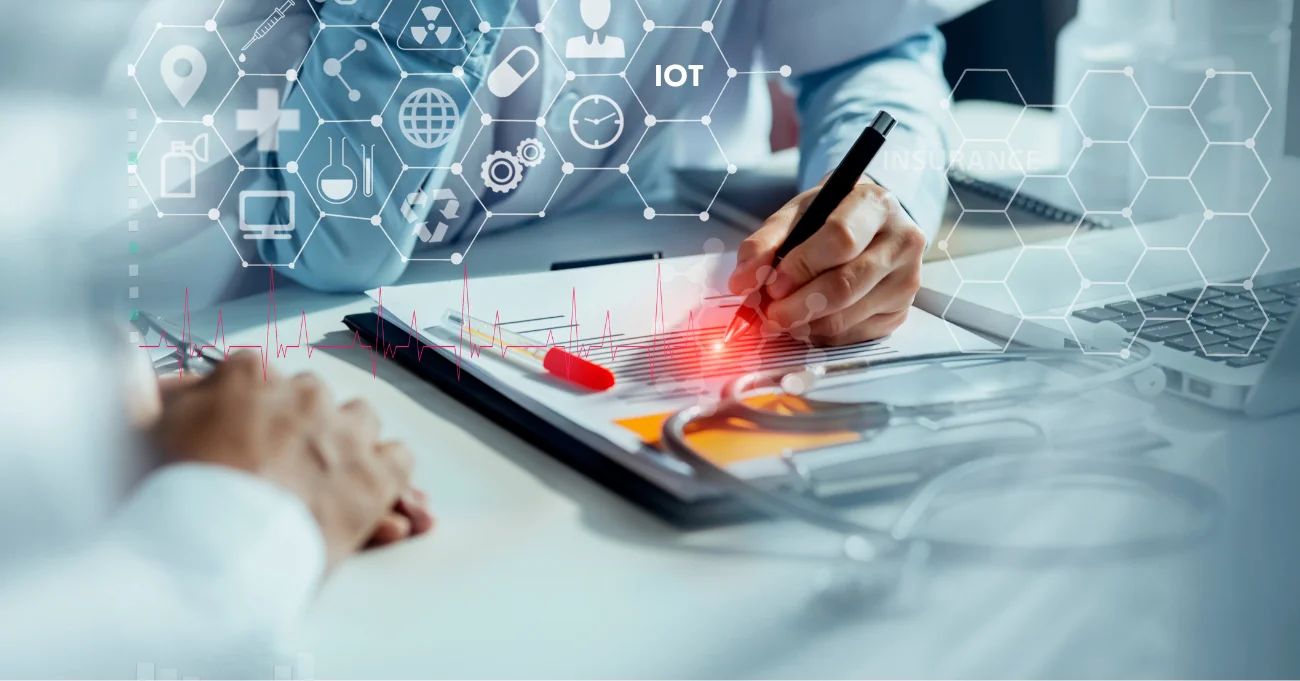When it comes to healthcare, technology is more than just a helping hand; it's a game-changer. As we look ahead to 2024, the Internet of Things (IoT) in healthcare is a perfect example of this. It's not just about fancy gadgets; it's about making real differences in how we look after our health. These IoT healthcare projects are changing the game, making things like keeping an eye on patients and getting treatments right easier and more efficient.
Here at Aloa, we're right in the thick of this tech revolution. We specialize in making offshore software development straightforward and reliable. By taking care of everything from picking the right developers to managing payments across borders, we've learned a lot about what makes tech in healthcare tick. We're not just talking from the sidelines – we've been hands-on in shaping how this technology grows and improves.
In this guide, we're going to walk you through some of the most exciting and important IoT projects in healthcare for 2024. From gadgets that help doctors keep track of their patients remotely to systems that crunch big health data to give better care, we'll show you what's on the horizon.
So, let's get started and see how these tech projects are making healthcare better and smarter.
9+ Types of IoT Healthcare Projects to Know About for 2024
In this guide, we're showcasing innovative IoT healthcare projects. Each represents a leap forward in how technology can enhance patient care and streamline healthcare processes. From remote monitoring devices to sophisticated data analysis tools, these projects are not just futuristic concepts but real-world solutions setting new standards in healthcare.
So, let's dive in and explore these groundbreaking developments that are shaping the future of medical technology
1. Smart Inhalers
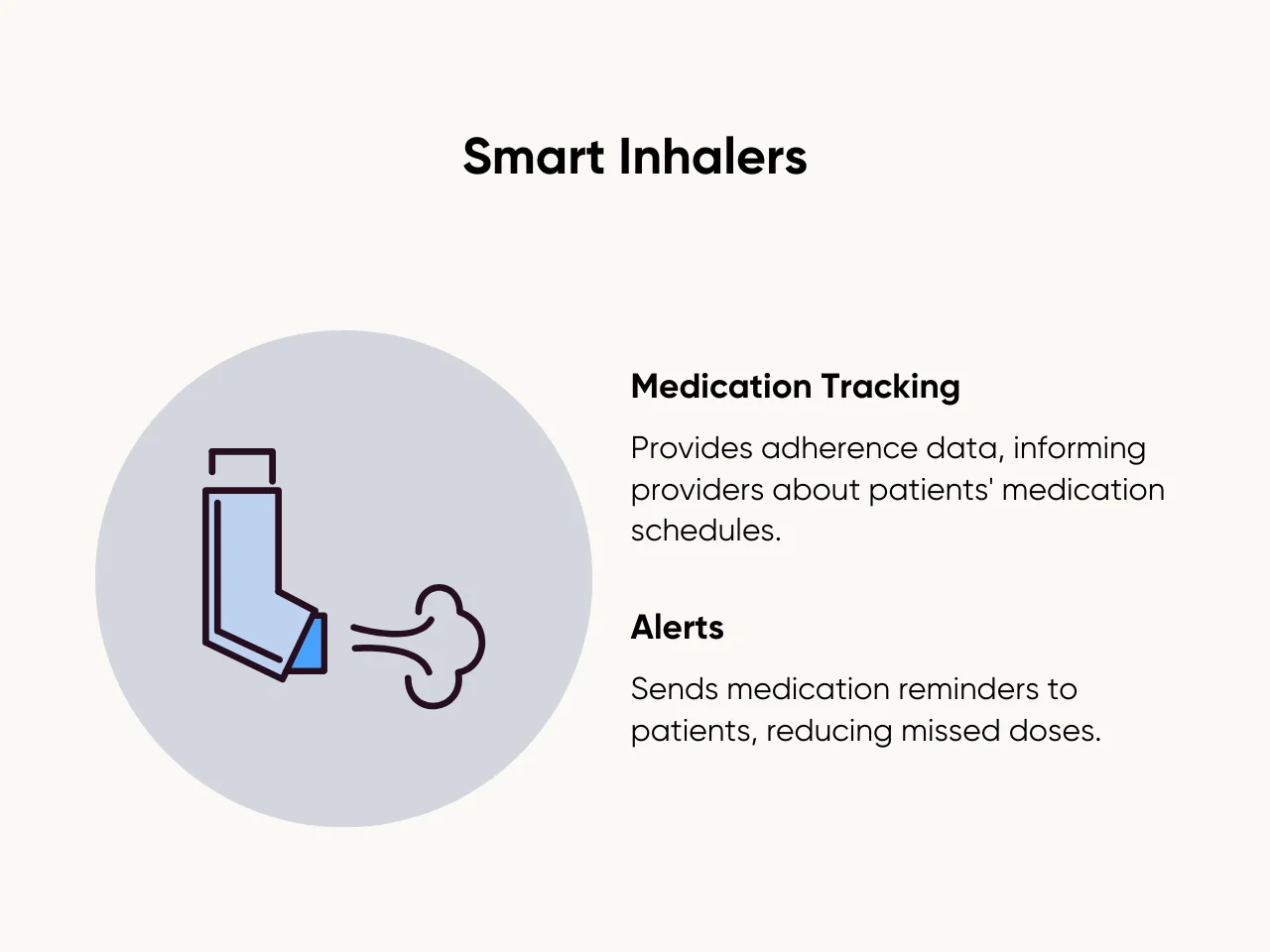
Smart inhalers mark a significant advancement in IoT healthcare projects. They equip regular inhalers with technology to observe medication usage and send this data to a mobile application. This unique approach empowers patients, particularly those with asthma or chronic obstructive pulmonary disease, to substantially improve their treatment management.
Use Cases
- Medication tracking: Provides adherence data, informing healthcare providers about patients maintaining their medication schedule.
- Alerts: Sends reminders to patients for their medication, reducing the chances of missing doses.
2. Remote Patient Monitoring
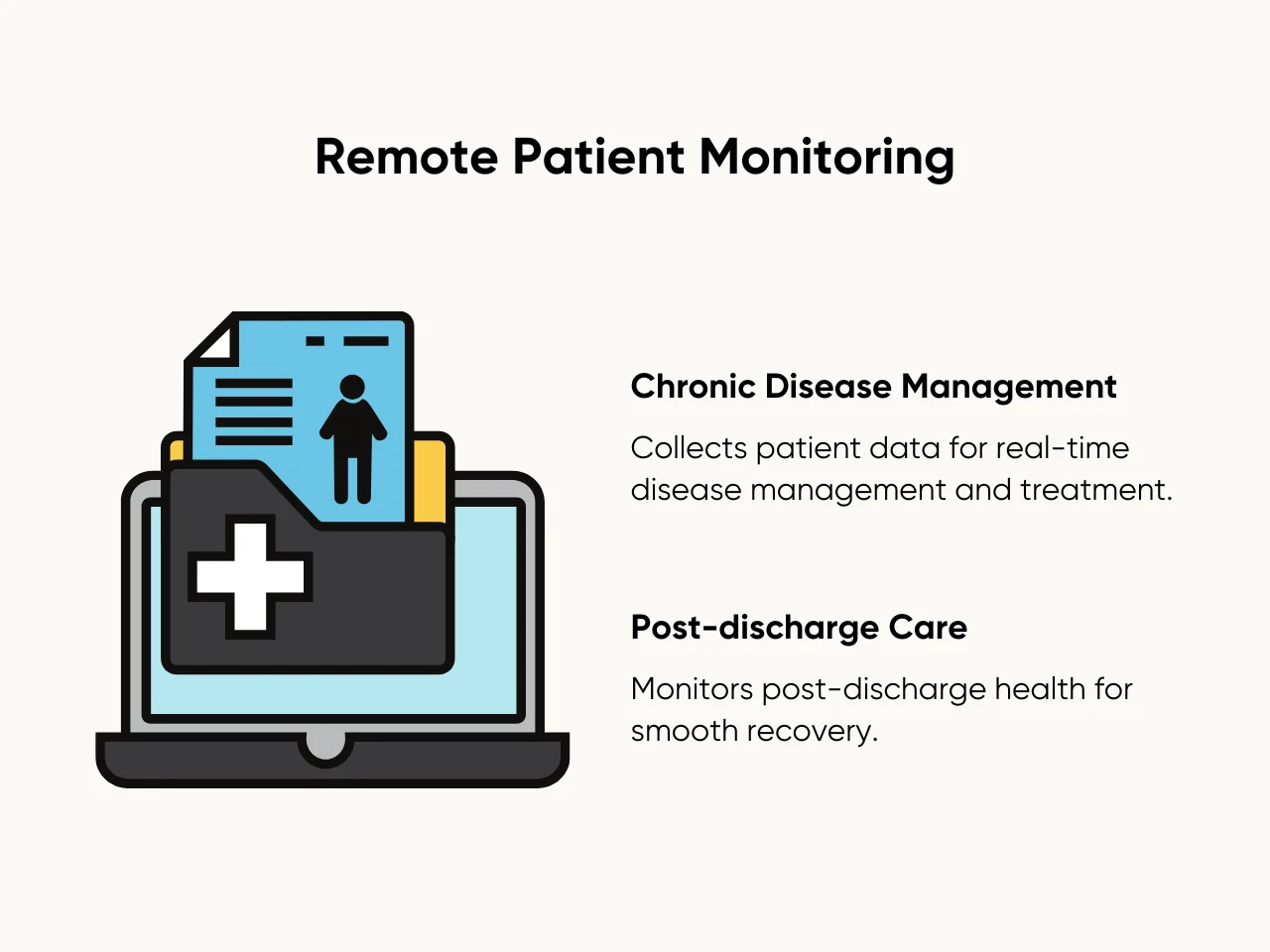
Remote patient monitoring, an innovative application of IoT in healthcare projects, is transforming homecare delivery. Utilizing IoT-enabled devices allows patient health metrics to be monitored without needing the patient to stay in a hospital – a step forward from customary healthcare approaches.
Use Cases
- Chronic Disease Management: Collects extensive patient data for real-time disease management and treatment adjustment.
- Post-discharge Care: Monitors patient's health post-discharge, ensuring a smooth recovery.
3. Connected Contact Lenses
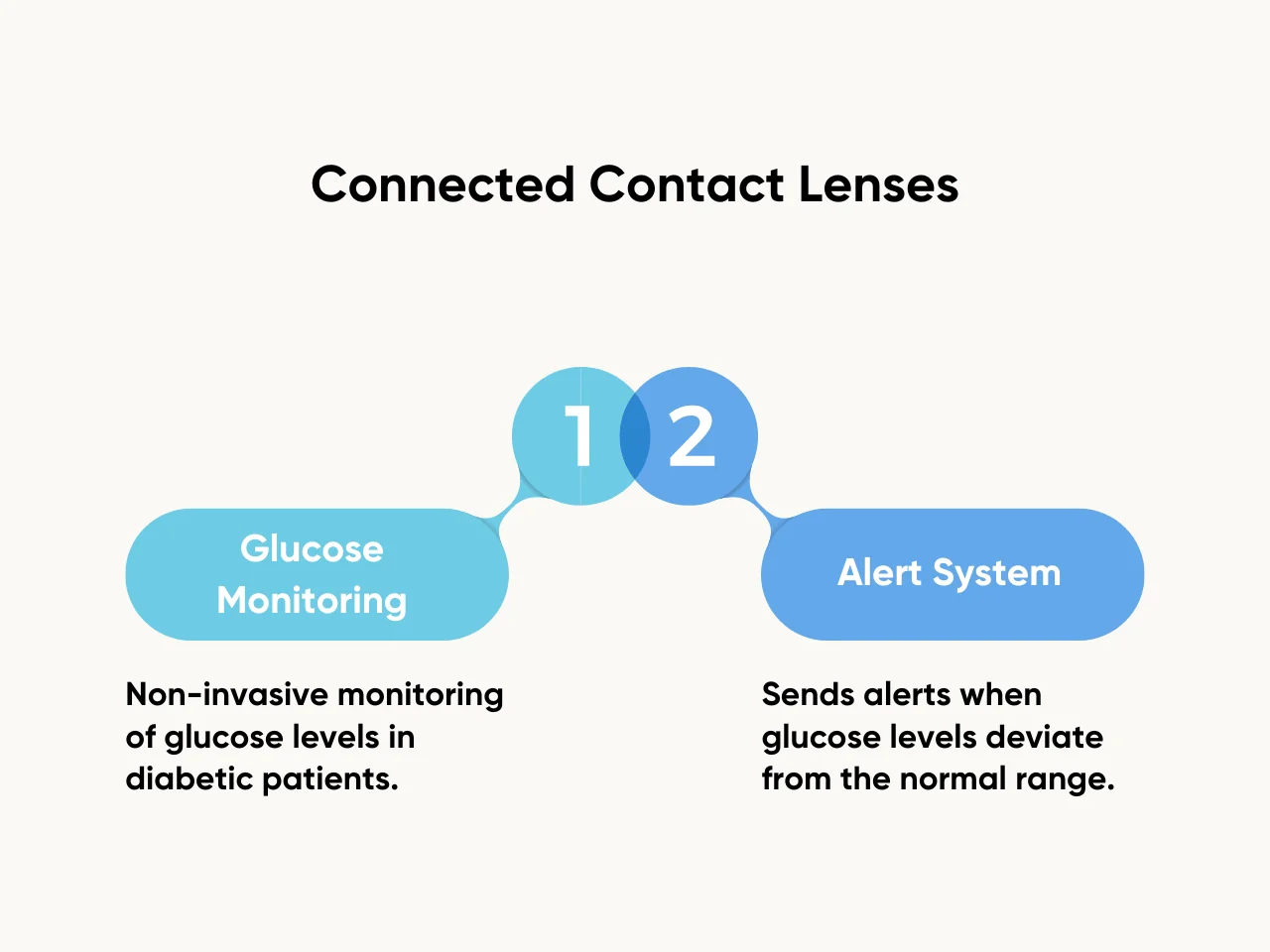
Connected contact lenses showcase an innovative application of IoT in healthcare projects. Integrated with IoT technology, connected contact lenses can measure glucose levels in diabetic patients through their tears. This approach is set to go past traditional glucose monitoring methods by eliminating blood pricks, providing a more streamlined monitoring process.
Use Cases
- Glucose Monitoring: Non-invasive monitoring of glucose levels in diabetic patients.
- Alert System: Sends alerts when glucose levels deviate from the normal range.
4. Smart Beds
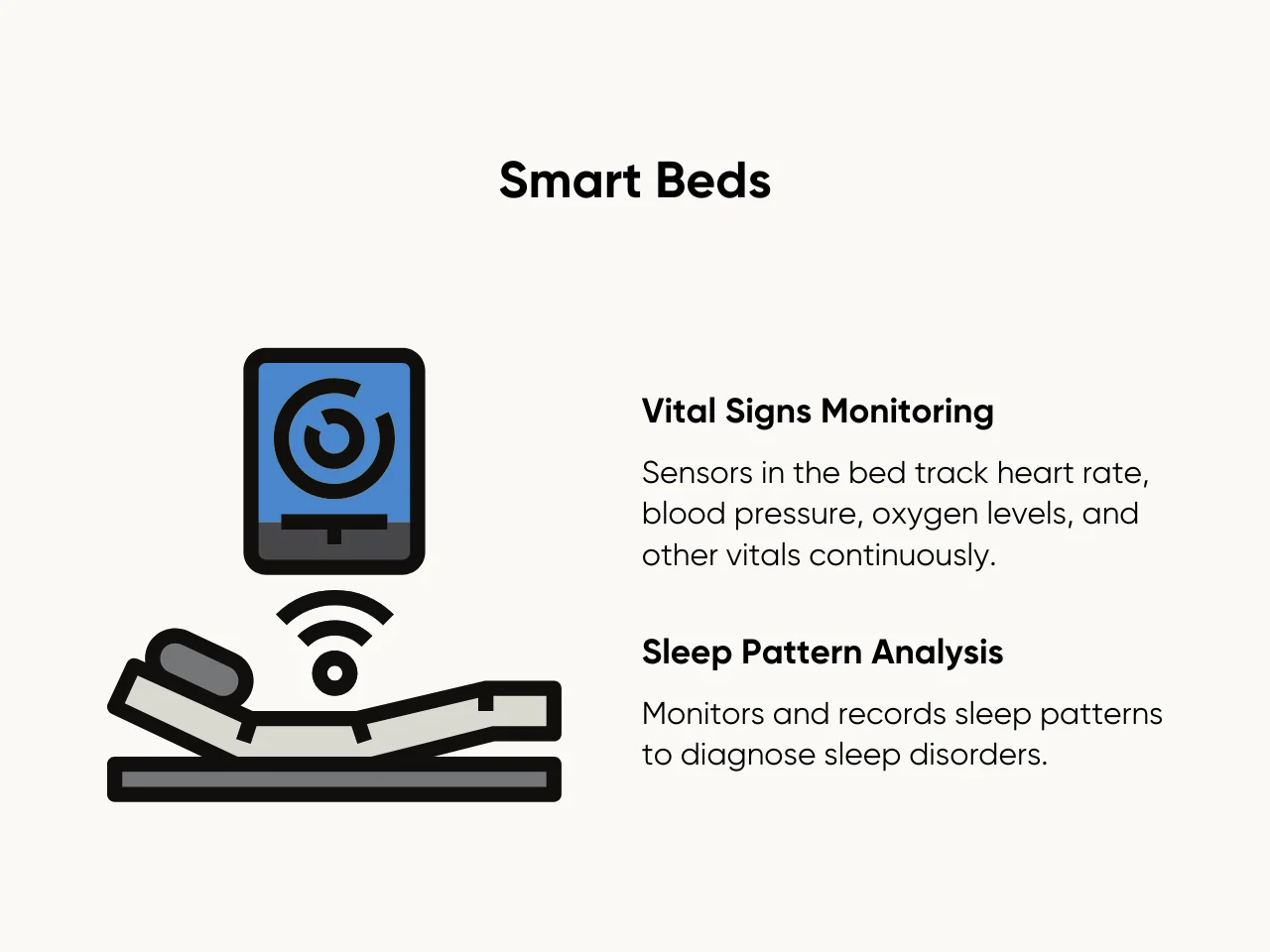
The continuous progression of IoT healthcare projects brings forth smart beds. These beds, equipped with sensors, continuously monitor the patient's vital signs and sleeping patterns, offering enhanced patient care. Optimal comfort delivered by the smart bed and the insightful data it provides make it a significant player in patient care.
Use Cases
- Vital signs monitoring: The sensors embedded in the bed track heart rate, blood pressure, oxygen levels, and other vital signs continuously.
- Sleep pattern analysis: Monitors and records sleeping patterns, crucial in diagnosing sleep disorders.
5. Wearable Fitness Devices
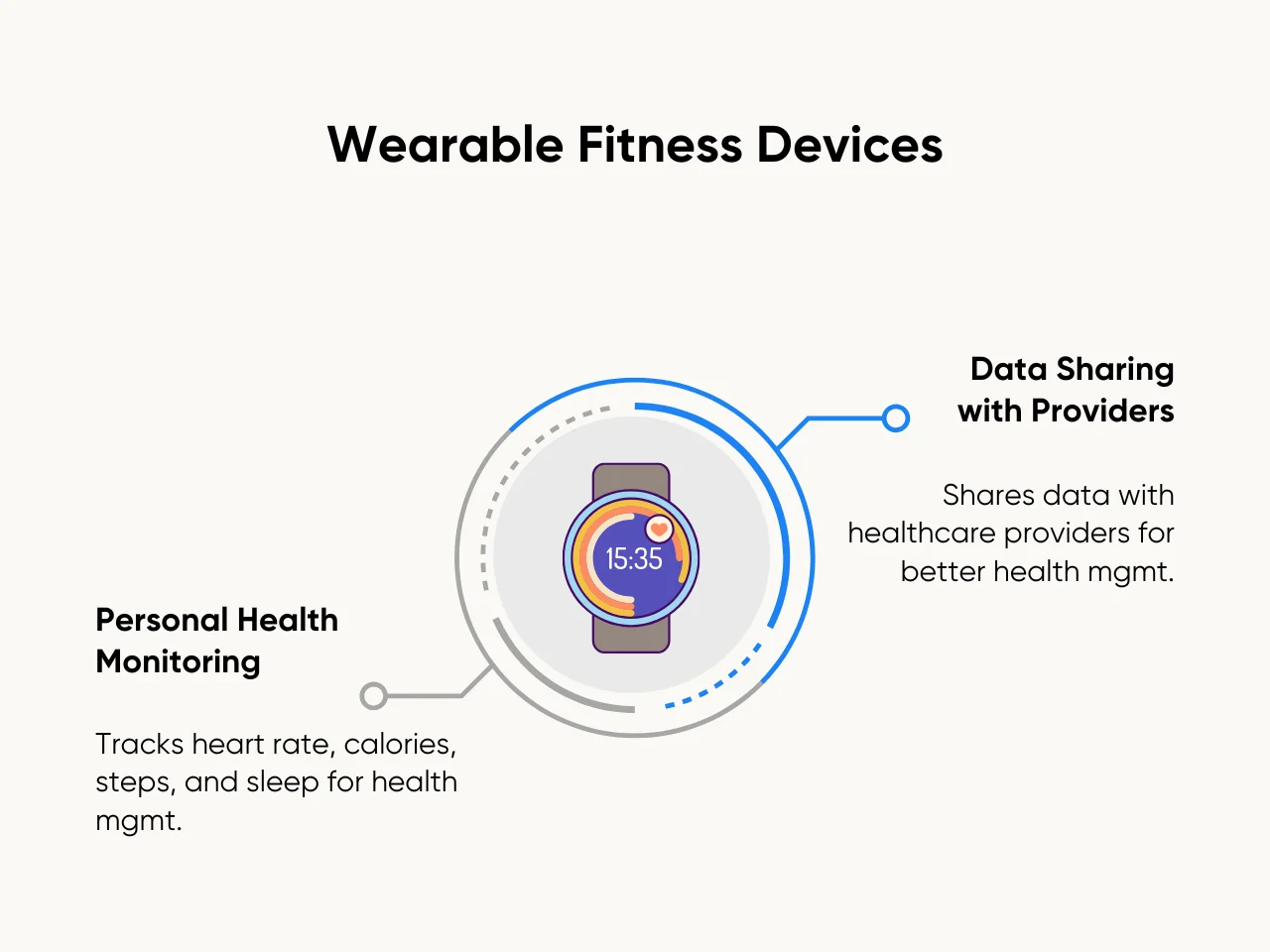
Wearable fitness devices are one of the prolific healthcare projects where IoT has been exceedingly impactful. Primarily used to monitor health metrics like heart rate, step counts, and sleep times, these wearable devices have been instrumental in encouraging proactive health and fitness management among individuals.
Use Cases
- Personal Health Monitoring: Tracks health parameters like heart rate, calories burned, steps walked, and hours slept for personal health management.
- Data-sharing with Healthcare Providers: Data from the wearable device can be shared with healthcare providers for better understanding and managing patient's health.
6. Smart Wheelchairs
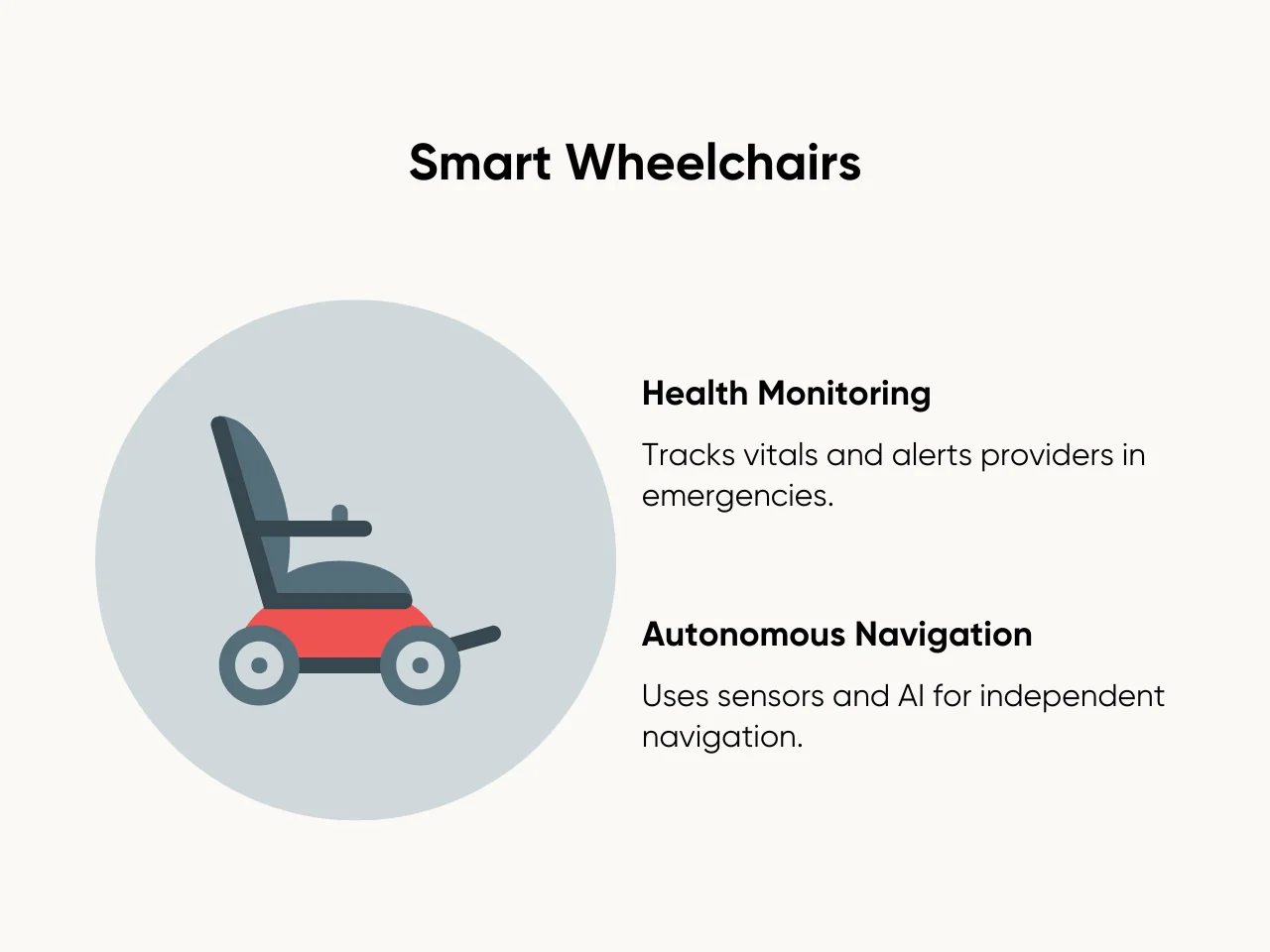
IoT in healthcare projects has transformed assistive technology, too, with smart wheelchairs serving as an excellent example. These IoT-powered wheelchairs offer increased independence to users with mobility impairments. The chairs can monitor user's health data and navigate autonomously, using sensors and artificial intelligence.
Use Cases
- Health Monitoring: Monitors and tracks the users' vitals, alerting healthcare providers in emergencies.
- Autonomous Navigation: Equipped with sensors and AI, these wheelchairs can navigate independently, reducing user efforts.
7. IoT-Enabled Prosthetics
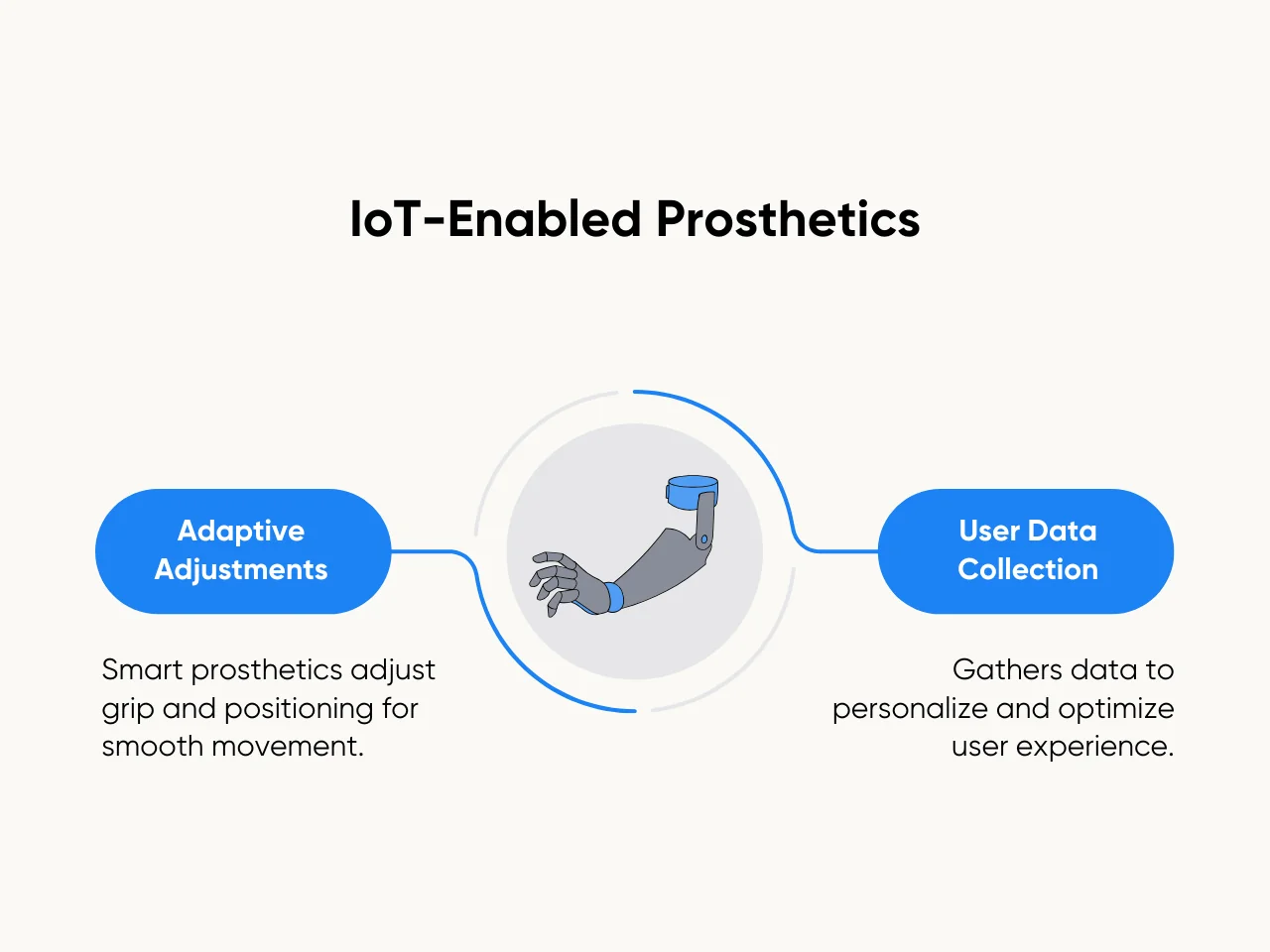
Expanding the reach of IoT in healthcare, smart prosthetics are changing lives. These IoT-enabled prosthetics offer enhanced functionality and adaptability, improving the user experience. Each movement and adjustment is made smoother, marking a significant advancement from traditional prosthetic devices.
Use Cases
- Adaptive Adjustments: Smart prosthetics can automatically adjust their grip or positioning based on the task, providing natural and smooth movement.
- User Data Collection: Collects user data to tailor the user experience, promoting comfortable and efficient use.
8. Automated Insulin Delivery Systems
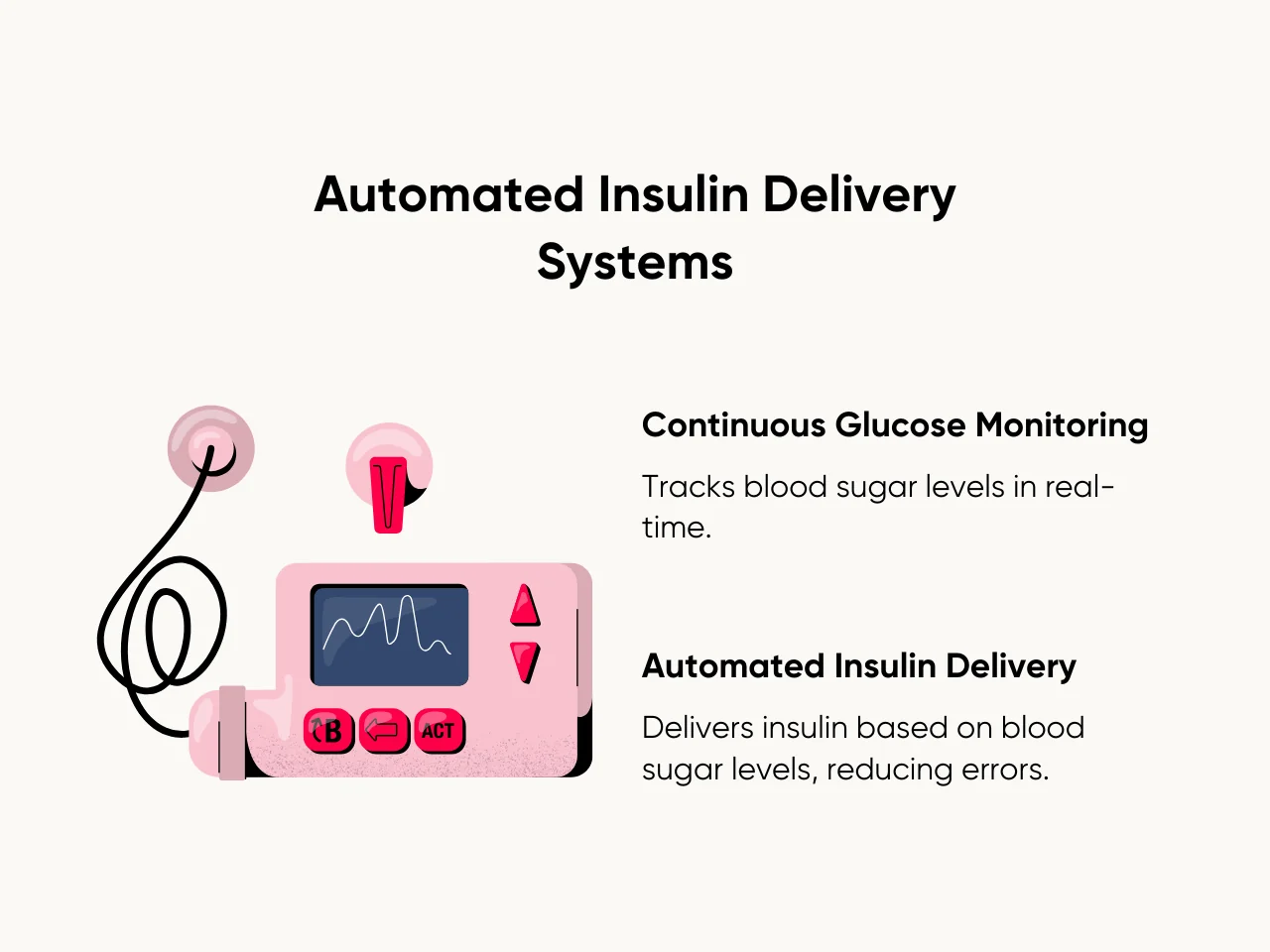
Taking a better route in diabetic care, automated insulin delivery systems are one of the considerations in IoT healthcare projects. These systems continuously monitor blood glucose levels and automatically deliver the required insulin dose, simplifying diabetes management.
Use Cases
- Continuous Glucose Monitoring: Detects blood sugar levels in real-time, enabling accurate and constant monitoring.
- Automated Insulin Delivery: Automatically delivers the correct insulin dose based on the monitored blood sugar levels, reducing human error.
9. Smart Pill Bottles
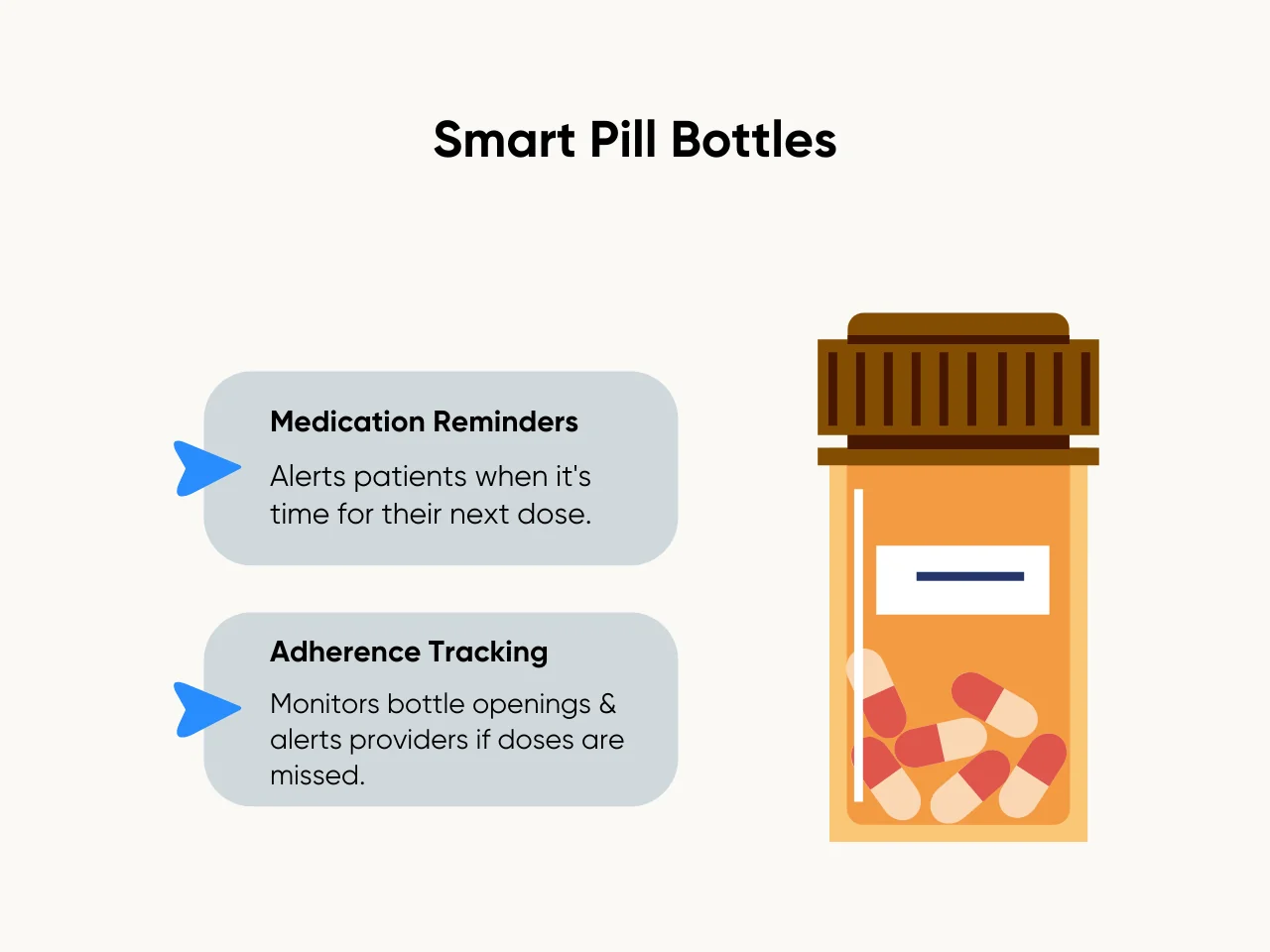
Smart pill bottles, another innovative application of IoT in healthcare projects, ensure medication adherence. Equipped with light, sound, and text alerts, they remind patients to take their medication, making them particularly valuable for patients with critical or long-term medication needs.
Use Cases
- Medication Reminders: Sends reminder alerts to patients when it's time for their next dose.
- Adherence Tracking: Tracks when the bottle is opened to monitor adherence, alerting healthcare providers if doses are missed.
10. Fall Detection Devices
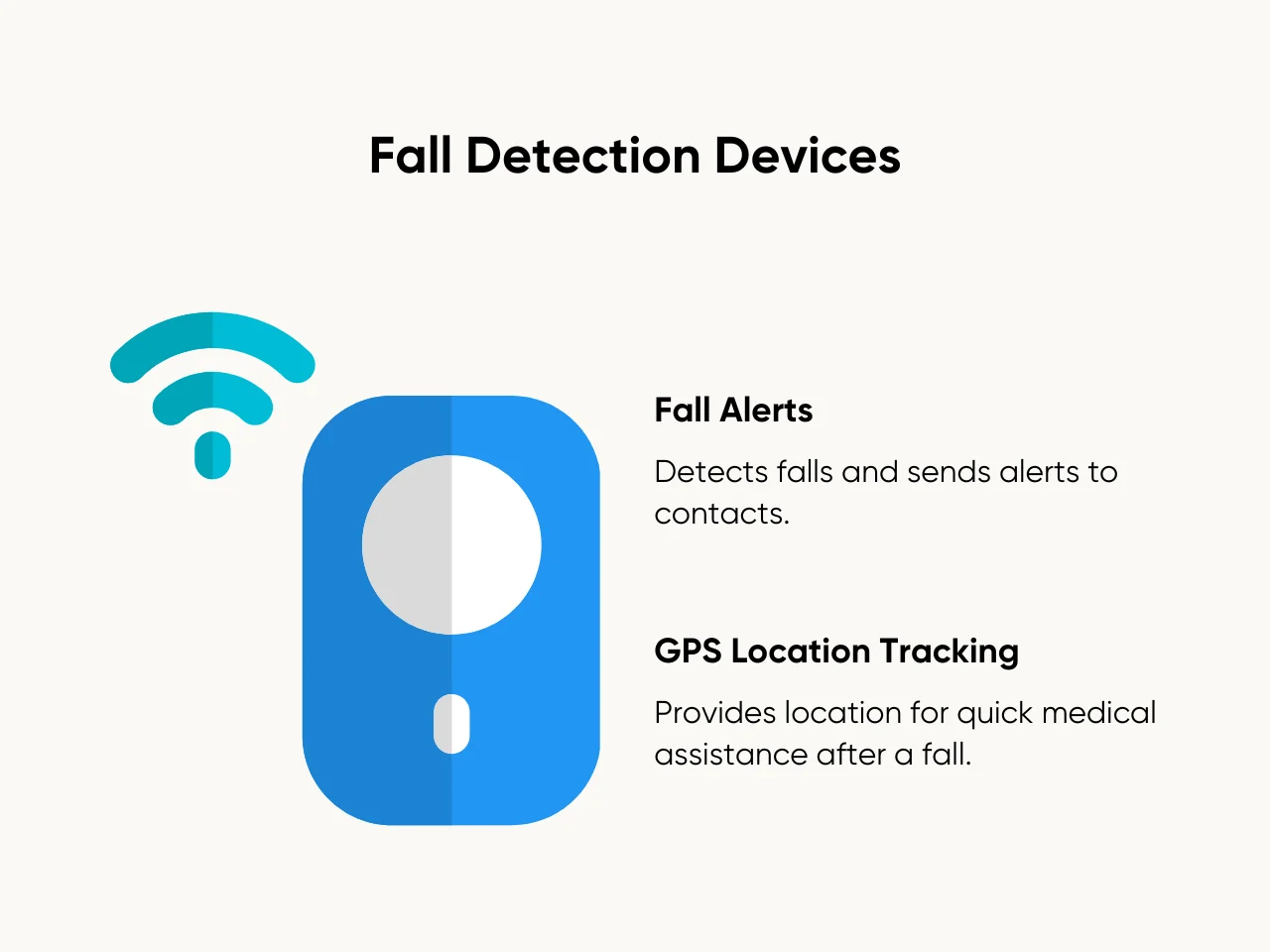
Fall detection devices stand as a noteworthy contribution to IoT healthcare projects. These devices, mainly worn as pendants or watches, automatically alert family members or healthcare providers if a fall is detected. They're particularly valuable for elderly care, ensuring immediate medical attention when necessary.
Use Cases
- Fall Alerts: Detects falls using sensors and sends immediate alerts to predefined contacts.
- GPS Location Tracking: In the event of a fall, the GPS feature enables the quick and accurate location of the individual for medical assistance.
11. Smart Pacemakers
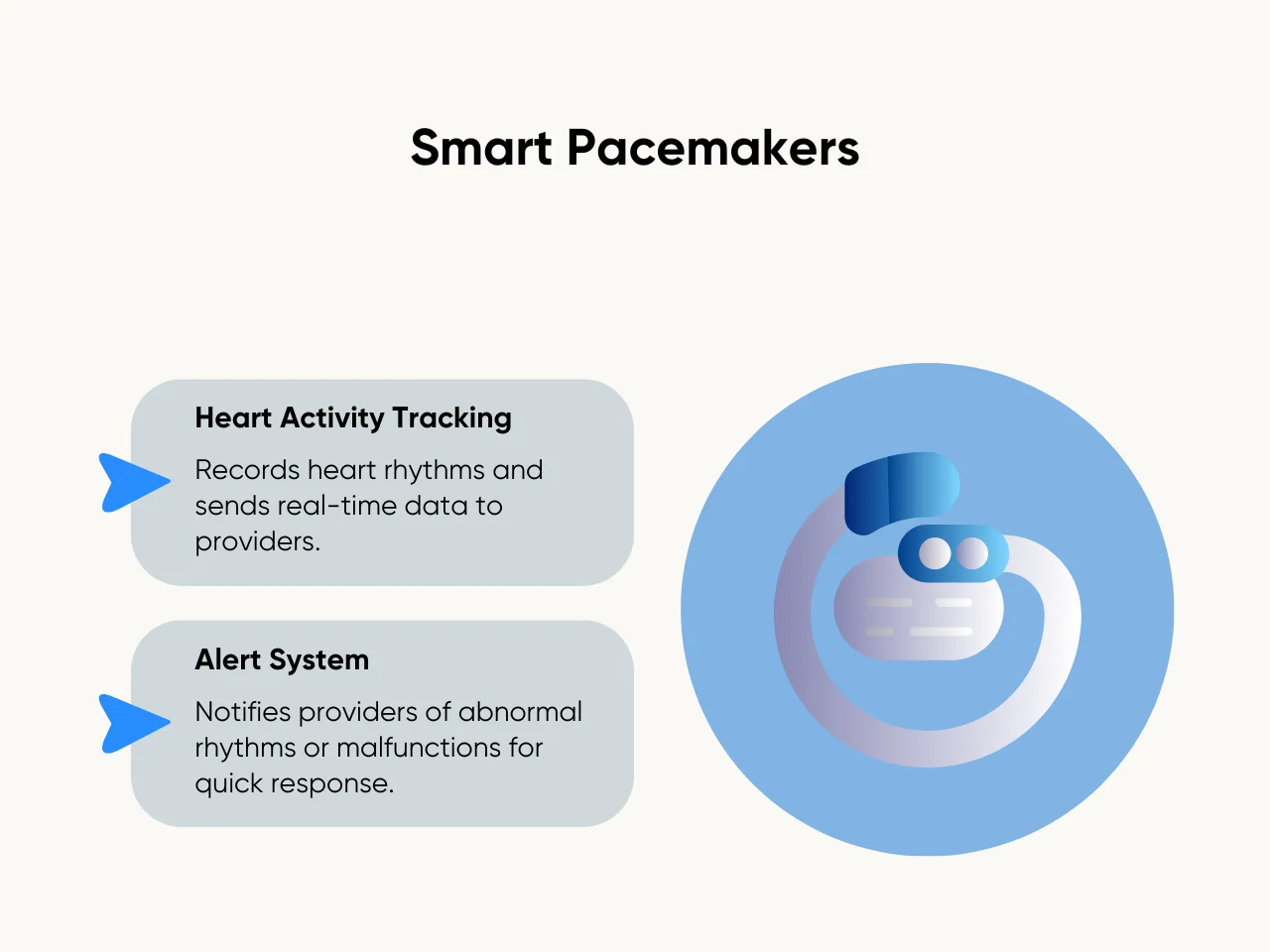
Smart pacemakers are a leap in IoT in healthcare projects. These advanced versions of traditional pacemakers are capable of real-time heart activity recording. By transmitting this data to healthcare providers, any potential heart irregularities can be addressed promptly, thereby elevating cardiac care.
Use Cases
Heart Activity Tracking: Records heart rhythms and sends real-time data to healthcare providers.
Alert System: In case of any abnormal heart rhythm or device malfunction, it alerts the healthcare provider, ensuring rapid response.
Why Aloa Cares: Our Role in Shaping IoT Healthcare Innovations
In the evolving landscape of IoT healthcare, our role at Aloa is pivotal yet straightforward. We're deeply invested in this tech revolution, not just as spectators but as active contributors. Our mission? To connect groundbreaking healthcare technologies with the software expertise that brings them to life.
Here's a closer look at how we're making a difference:
- Sourcing the Right Tech Talent: The heart of every IoT healthcare device lies in its software. This is where our expertise shines. We excel in identifying developers who don’t just write code but understand the nuances of healthcare technology. It's about finding those who can translate complex health data into accessible, actionable insights.
- Streamlining the Development Journey: We know the road to developing healthcare software is filled with intricate challenges. Our approach is tailored to make this journey as smooth as possible. From selecting the best developers to navigating international payments, we handle the details so that the focus remains on innovation and quality.
Why does this matter? At the core of IoT healthcare is enhancing patient care and making healthcare more accessible and efficient. The software powering these devices plays a crucial role – it turns a wearable device into a life-saving tool or an intelligent inhaler into a daily health companion. Our goal at Aloa is to ensure that this underlying software is robust, reliable, and capable of driving healthcare forward.
Our involvement in IoT healthcare projects isn't just about technology. It's about facilitating solutions that have a real impact on people's lives. By bridging the gap between healthcare needs and technological capabilities, we're helping to shape a future where healthcare is more connected, responsive, and patient-centric.
IoT Healthcare Trends to Consider in 2024
As we look towards 2024, IoT is not just a buzzword; it's a beacon of hope, opening new avenues for patient care and medical efficiency. These trends in IoT healthcare are more than technological advancements; they represent a fundamental shift in how we approach health and wellness
So, let's explore these trends and understand how they're shaping the future of healthcare, making it smarter, faster, and more responsive to patient needs.
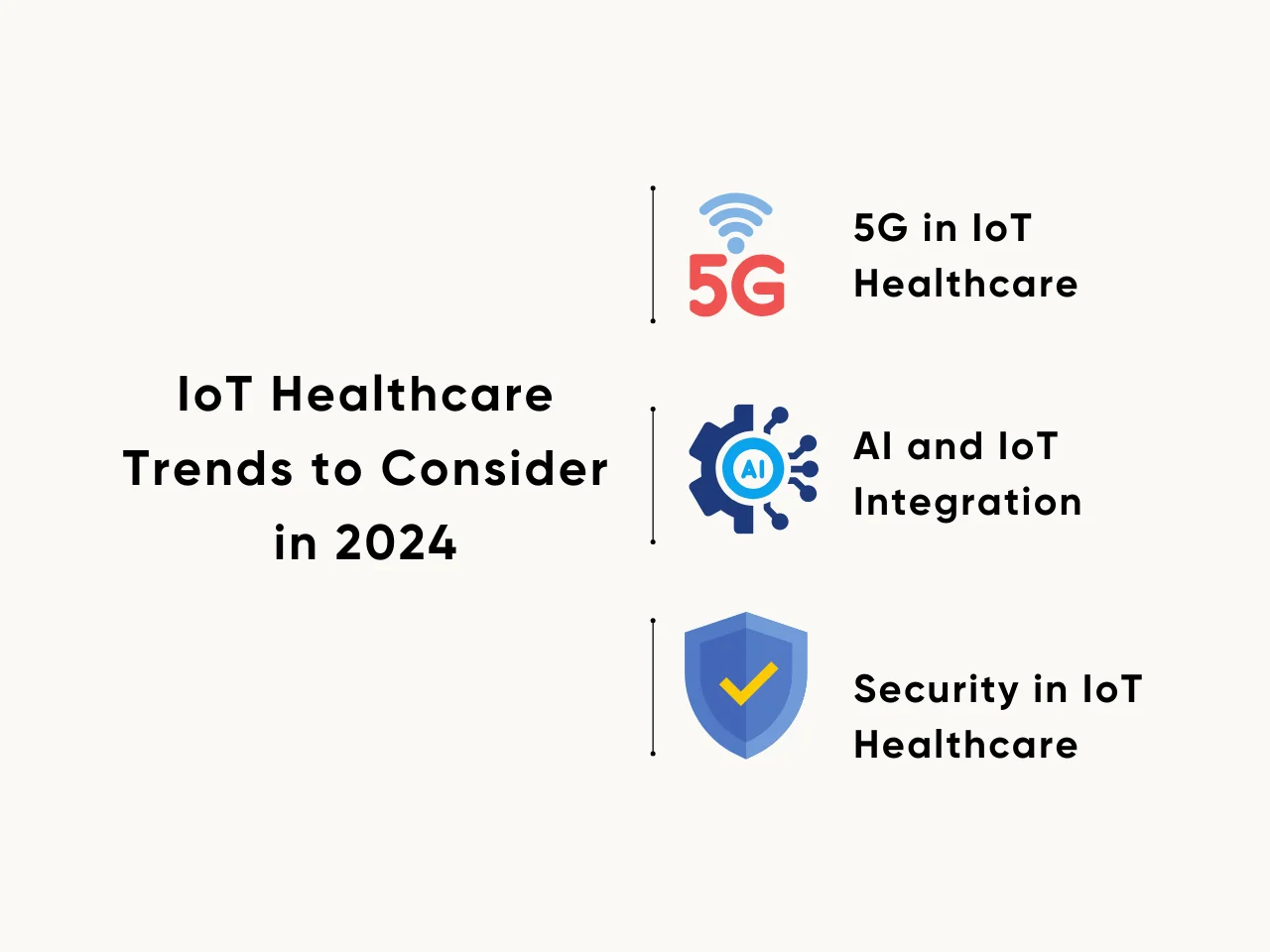
1. 5G in IoT Healthcare
One of the most exciting developments to watch in IoT healthcare projects is integrating 5G technology. With its superior speed and reduced latency, 5G is all set to improve how healthcare information is shared and received. The capacity to manage the massive volume of real-time data generated by IoT devices sets it apart.
Benefits
- Real-time Data Transfer: The unmatched speed of the 5G network transforms the way health data is transmitted from IoT devices. It ensures real-time communication, which is critical during emergencies and surgeries.
- Enhanced Remote Patient Monitoring: With stable and fast 5G connectivity, remote patient monitoring using IoT devices can be more efficient and reliable – a key to superior healthcare delivery.
5G for IoT healthcare projects is expected to handle 1000x more traffic and up to 100x more connected devices than its predecessor, 4G. This indicates a new era of real-time, data-rich, and reliable healthcare services.
2. AI and IoT Integration
Artificial Intelligence (AI) with IoT in healthcare projects is rapidly gaining attention. AI's promising algorithms, when used in conjunction with IoT devices, can significantly enhance these devices' predictive, analytical, and diagnostic capabilities.
Benefits
- Predictive Analysis: AI can predict potential health risks based on the data collected from IoT devices, promoting proactive healthcare and early intervention.
- Personalized Patient Care: By analyzing individual health data, AI can develop customized care plans catering to the patient's needs.
The integration of IoT and AI in healthcare holds the potential to significantly reduce global healthcare costs by replacing traditional disease detection methods with highly efficient preventive healthcare systems.
3. Security in IoT Healthcare
As healthcare projects use IoT devices to collect vital patient data, ensuring robust security frameworks has become crucial. Implementing stringent security measures is essential to preserve the IoT healthcare system's integrity and protect sensitive patient data.
Benefits
- Patient Data Protection: Strong security protocols assure privacy, safekeeping, and secure transmission of health data, which is vital in maintaining patient trust.
- System Integrity: By shielding IoT systems from potential security breaches, these measures improve the reliability and trustworthiness of IoT healthcare technologies.
With the number of IoT devices in healthcare predicted to increase significantly, investing in robust security measures is more critical than ever. It ensures that these healthcare projects using IoT remain reliable and safe sources of health data collection.
Key Takeaway
It's clear that IoT healthcare projects are revolutionizing the industry for the better. By enabling more efficient patient monitoring and treatment, these innovations are opening new frontiers in healthcare technology.
Aloa stands at the forefront of this revolution, offering expertise in offshore software development that is both reliable and predictable. With our comprehensive approach to managing everything from selecting skilled developers to handling international payments, we are ideally positioned to support businesses looking to start IoT healthcare projects. Our experience and success in this field make us a trusted partner in navigating the complexities of such innovative ventures.
If you're considering an IoT project in healthcare and looking to leverage the latest technology for improved patient care and operational efficiency, Aloa is your go-to expert. Reach out to us at [email protected] to discuss how we can bring your project to life, saving you time and money while ensuring top-quality results.
Let's work together to make a tangible difference in the healthcare industry through cutting-edge technology.

